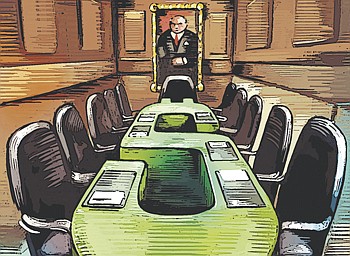It's tough all over
<strong>Pay drops for most CEOs of local public companies</strong>
Sunday, May 2, 2010
Most executives of public companies based in the Chattanooga area felt their wallets become a little lighter last year.
"The economy affected companies the most," said Paul Hodgson, senior research associate with The Corporate Library in Portland, Maine.
Nationwide, the majority of CEOs' total pay dropped about 7 percent in 2009, Mr. Hodgson said the corporate governance research group's preliminary survey of executives salaries showed.
Mr. Hodgson said many companies underperformed or their shares had lost value and the CEOs weren't awarded as much in compensation as a couple years ago.
At floorcovering maker The Dixie Group, an across-the-board reduction in executive base salaries equal to 10 percent to 15 percent was put into effect, according to the company's proxy statement.
Dixie CEO Daniel K. Frierson's salary went from $560,000 in 2008 to $490,000 in 2009 as the company, along with the rest of the industry, dealt with the downturn in housing.
"We continue to be diligent in seeking out growth opportunities and still maintain tight cost controls in this slow economic recovery period," he said while announcing company quarterly financials last week. "As past experience has shown us, we see the residential business recovering faster than the commercial business."
At Mohawk Industries, one of the two biggest flooring companies countrywide along with Shaw Industries, CEO Jeffrey S. Lorberbaum's base salary grew just $10,000 in 2009 to $990,000. But stock awards fell over $40,000 to cut his total compensation to $1.49 million compared to $1.56 million in 2008 and $2.58 million in 2007, the company's proxy shows.
J. Don Brock, chief executive of asphalt equipment maker Astec Industries, saw no increase in his base salary in 2009 over 2008. In addition, he saw no profit share distribution last year, compared to $250,000 in 2008, figures show.
BONUSES TO RISE?
Mr. Hodgson said that in 2010, the first part of CEO compensation to recover could be the annual cash bonuses as company revenues increase.
Miller Industries Co-CEO Jeffrey I. Badgley received only a $150 bonus in 2009 after securing $47,100 in 2008, according to the company's proxy.
But, Mr. Hodgson said, with the way share prices have bounced back for many companies, stock-based compensation likely will recover as well.
For Unum Group CEO Thomas R. Watjen, the proxy's summary compensation table differs from the company's compensation committee analysis of his earnings. The company said that's due to various SEC accounting and actuarial regulations dictating how income is to be reported to shareholders.
Mr. Watjen's base salary was basically flat in 2009, though his total compensation rose from $7.7 million to $8.7 million due to the company's positive performance, according to the insurer's analysis.
At CBL, Charles B. Lebovitz, who in 2009 was chairman and CEO of the shopping center developer, received a $337,000 bonus after receiving none in 2008. The company said bonuses awarded to CBL executives were at 50 percent the historic level.
The proxy also said CBL is holding base salaries in 2010 at the 2009 mark for top execs. Mr. Lebovitz' son, Stephen, was named CEO on Jan. 1, while the senior Lebovitz remains company chairman.
Mr. Hodgson said the financial reform legislation before Congress, if it passes, won't affect executive compensation much. But, he said he didn't expect the issue will retreat from the limelight.
